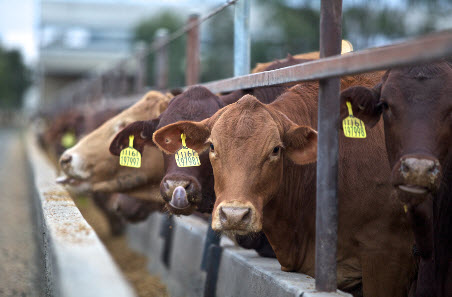
The feed additive reducing methane emissions by up to 90%
Key points
- When the feed additive Bovaer® was added at a rate of 100–125mg/kg DM to Australian barley-based finishing diets containing Monensin and 7% fat (DM-basis), methane production and yield was reduced by up to 90%.
- Average daily gain and feed conversion ratios for steers were in line with industry expectations.
- Bovaer® (3-NOP) is safe and very effective at reducing methane emissions in feedlot cattle and could potentially help the industry move towards carbon neutrality.
The use of the feed additive Bovaer® (3-NOP) was recently evaluated as part of an MLA-funded project on reducing enteric methane emissions in Australian feedlot operations, and was found to reduce methane production by up to 90%.
The trial, which tested Bovaer® at different inclusion rates, was completed at the University of New England and is linked to the Australian red meat industry’s target to be carbon neutral by 2030.
Bovaer® (3-NOP), developed by DSM, was evaluated for the first time under Australian feedlot conditions under the supervision of Professor Roger Hegarty and Dr Amelia De Almeida.
A total of 20 Angus Steers were provided with different rates of Bovaer®, ranging from 0.5g up to 1.25g a day over 112 days in a typical Australian feedlot finisher ration.
At the lowest rate, a methane reduction of 60% was observed, and at the highest inclusion rate, methane emissions reduced by 90%.
Steers in the study had average daily gain and feed conversion ratios in line with industry expectations, with Bovaer® treatment steers performing as ‘good or better’ than control steers in these performance parameters.
Professor Hegarty said he had seen research about Bovaer® from other geographies and was curious how the product would perform under Australian conditions.
“We’re excited about the strong results, and we’ll continue to research how to bring this product to more extensive operations,” he said.
Mark van Nieuwland, Program Director at DSM, also shares this enthusiasm.
“We look forward to bringing Bovaer® to market in Australia in the near term. These exciting results are an important building block in that journey,” Mark said.
Next steps
The full results of the research will be published in a scientific peer-reviewed journal in the coming months. Planning is underway for further scaled trials with the support of MLA, as well as discussion on inclusion in carbon accounting methodologies and sustainability frameworks.
DSM is preparing for a launch in Australia, as of one of the first markets globally to have access to Bovaer®.
Bovaer®10: Your questions answered | Meat & Livestock Australia



